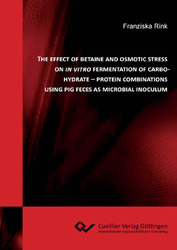| Areas | |
|---|---|
| Serie de libros (97) |
1381
|
| Nachhaltigkeit |
3
|
| Gesundheitswesen |
1
|
| Letra |
2370
|
| Ciencias Naturales |
5407
|
| Matemática | 228 |
| Informática | 319 |
| Física | 980 |
| Química | 1364 |
| Geociencias | 131 |
| Medicina humana | 243 |
| Estomatología | 10 |
| Veterinaria | 108 |
| Farmacia | 147 |
| Biología | 835 |
| Bioquímica, biología molecular, tecnología genética | 121 |
| Biofísica | 25 |
| Nutrición | 45 |
| Agricultura | 1005 |
| Silvicultura | 201 |
| Horticultura | 20 |
| Ecología y conservación de la tierra | 148 |
| Ciencias Ingeniería |
1798
|
| General |
98
|
|
Leitlinien Unfallchirurgie
5. Auflage bestellen |
|
Erweiterte Suche
The Effect of Betaine and Osmotic Stress on In Vitro Fermentation of Carbohydrante - Protein Combinations using Pig Fences as Microbial Inoculum (Tienda española)
Franziska Rink (Autor)Previo
Indice, Datei (38 KB)
Lectura de prueba, Datei (79 KB)
Weaning in piglets is characterized by nutritional, environmental and social stress, often associated with reduced body weight gain, nutrient malabsorption and increased incidence of diarrhea. In fact, dietary components such as carbohydrates and protein, but also a variety of feed additives may affect the intestinal microbial ecosystem. In most of the in vitro fermentation studies over the past years, a buffered system was used to maintain a constant osmolarity, thereby minimizing osmotic stress for the microbes and supporting optimal fermentation conditions. In the present work, the Hohenheimer Futterwerttest (HFT) was modified by increasing osmolarity in the medium, to impose osmotic stress on the microbes. Increased osmolarity in the environment might be more related to in vivo conditions, as they may occur during stress situations, e.g. diarrhea (chapter 3). Therefore, effects of an osmotic stress situation on selected bacteria strains in vitro were qualitatively and quantitatively analyzed by use of molecular techniques (real-time PCR) (chapter 3). In addition, the feed additive betaine, which is one of the most ubiquitous compatible solutes used both by prokaryotic and eukaryotic cells, has been suggested to enhance microbial fermentation. Therefore, the effects of betaine in combination with different carbohydrates and proteins on fermentation characteristics were tested under normal (chapter 2) and osmotic stress conditions (chapter 4) in vitro. In conclusion, increased osmolarity in vitro may influence microbial fermentation and bacterial composition by creating a stress situation for the microbiota of the inoculum.
| ISBN-10 (Impresion) | 3869558563 |
| ISBN-13 (Impresion) | 9783869558561 |
| ISBN-13 (E-Book) | 9783736938564 |
| Formato | A5 |
| Idioma | Inglés |
| Numero de paginas | 155 |
| Laminacion de la cubierta | Brillante |
| Edicion | 1 Aufl. |
| Volumen | 0 |
| Lugar de publicacion | Göttingen |
| Lugar de la disertacion | Universität Hohenheim |
| Fecha de publicacion | 22.08.2011 |
| Clasificacion simple | Tesis doctoral |
| Area |
Agricultura
|








